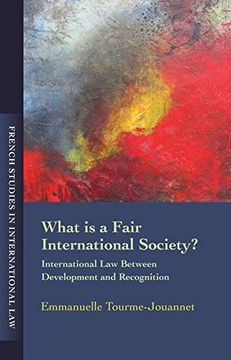Compartir
What is a Fair International Society? International law Between Development and Recognition (French Studies in International Law) (en Inglés)
Jouannet (Autor)
·
Bloomsbury Publishing Plc
· Tapa Blanda
What is a Fair International Society? International law Between Development and Recognition (French Studies in International Law) (en Inglés) - Jouannet
$ 61.160
$ 101.940
Ahorras: $ 40.780
Elige la lista en la que quieres agregar tu producto o crea una nueva lista
✓ Producto agregado correctamente a la lista de deseos.
Ir a Mis Listas
Origen: Reino Unido
(Costos de importación incluídos en el precio)
Se enviará desde nuestra bodega entre el
Miércoles 15 de Mayo y el
Lunes 20 de Mayo.
Lo recibirás en cualquier lugar de Chile entre 1 y 3 días hábiles luego del envío.
Reseña del libro "What is a Fair International Society? International law Between Development and Recognition (French Studies in International Law) (en Inglés)"
Today's world is post-colonial and post-Cold War. These twin characteristics explain why international society is also riddled with the two major forms of injustice which can be identified as afflicting national societies. First, the economic and social disparities between States caused outcry in the 1950s when the first steps were taken towards decolonization. These inequalities, to which a number of emerging States contributed, are still glaring and still pose the problem of the gap between formal equality and true equality. Second, international society is increasingly confronted with culture- and identity-related claims, stretching the dividing line between equality and difference. The less-favored States (those that feel stigmatized), as well as native peoples, ethnic groups, minorities, and women, now aspire to both legal recognition of their equal dignity and the protection of their identities and cultures. Some even seek reparation for injustices arising from the past violation of their identities and the confiscation of their property or land. In answer to these two forms of injustice claims, the subjects of international society have come up with two types of remedy encapsulated in legal rules: the law of development and the law of recognition. These two sets of rights are neither wholly autonomous and individualized branches of law, nor formalized sets of rules. They are imperfect and have their dark side, yet they can be seen as the first milestones towards what might become a fairer international society; one that is both equitable (as an answer to socio-economic injustice) and decent (as an answer to cultural injustice). This book explores this evolution in international society, setting it in historical perspective and examining its presuppositions and implications. The book shows how international law is shifting towards the recognition of socio-economic justice as its foundation, and it explains international law's trajectory towards 'fairness.' (Series: French Studies in International Law - Vol. 5)
- 0% (0)
- 0% (0)
- 0% (0)
- 0% (0)
- 0% (0)
Todos los libros de nuestro catálogo son Originales.
El libro está escrito en Inglés.
La encuadernación de esta edición es Tapa Blanda.
✓ Producto agregado correctamente al carro, Ir a Pagar.

